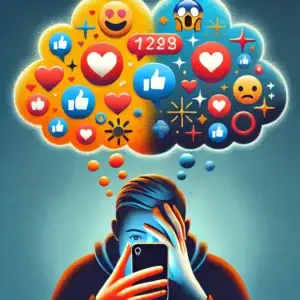Social media is everywhere. Whether it’s catching up with friends or staying on top of global events, platforms like Instagram, Facebook, TikTok, and Twitter (now X) have become a regular part of our daily lives. While social media brings plenty of perks, like connection and access to information, it can also affect our mental health in ways we might not immediately recognize. Whether it’s feeling the pressure to measure up to others or being bombarded with too much information, it’s crucial to understand how social media impacts your well-being and what you can do to protect your mental health.
The Double-Edged Sword of Social Media
Social media can be a fantastic tool for staying connected, but it’s not without its downsides. On the plus side, it helps us maintain relationships, find communities that resonate with us, and even access mental health resources. But there’s also a flip side: the constant exposure to idealized lives can stir up feelings of inadequacy or even anxiety.
The Positive Side
- Connection and Support: Social media bridges distances, keeping us connected to loved ones no matter where they are. It’s also great for finding communities and support networks, especially if you’re feeling lonely or isolated.
- Access to Information: Whether you’re diving into a new hobby, learning something new, or keeping up with important topics, social media is a wealth of knowledge. You can also access mental health resources at the touch of a button.
- Self-Expression: Social media gives everyone a platform to share their voice, be creative, and express themselves through posts, photos, or videos. It’s a place where you can tell your story and connect with others who relate to your experiences.
The Negative Side
While social media has its perks, it also has a darker side when it comes to mental health. The constant pressure to keep up and compare yourself to others can take a toll on your emotional well-being.
- The Comparison Trap: It’s easy to fall into the habit of comparing your life to others’ highlight reels. Whether it’s someone’s vacation or career milestone, social media often shows a polished, picture-perfect version of reality. This can lead to feelings of inadequacy or lower self-esteem.
- Fear of Missing Out (FOMO): Social media has a knack for making us feel like we’re missing out on something exciting. Whether it’s an event, a trend, or a lifestyle, this fear can create anxiety and make us feel like we’re not living life to the fullest.
- Cyberbullying and Harassment: Unfortunately, social media can also be a breeding ground for negativity. Cyberbullying and online harassment can severely affect mental health, leaving individuals feeling isolated, scared, or depressed.
- Overstimulation and Burnout: Constantly scrolling through social media can be mentally exhausting. The nonstop influx of content can overwhelm your brain, leading to anxiety, burnout, and even depression, especially if you find it hard to disconnect.
How Social Media Affects Mental Health
The impact of social media on mental health depends on how you use it, how often, and the kind of content you engage with. Here are a few ways it can affect your emotional well-being:
- Increased Anxiety and Depression: Studies show that heavy social media use is linked to higher levels of anxiety, depression, and loneliness. Whether it’s comparing yourself to others or dealing with negative content, these experiences can lead to feelings of isolation or despair.
- Sleep Disruption: Scrolling late into the night? The blue light from your phone can mess with your body’s natural sleep rhythms, affecting your sleep quality. Poor sleep is closely tied to mental health issues like anxiety and depression.
- Negative Body Image: Social media often promotes unrealistic beauty standards through filters and edited images. This can lead to dissatisfaction with your appearance, especially for younger users, contributing to low self-esteem or even eating disorders.
- Addiction to Validation: Social media is designed to keep you coming back for more. The pursuit of likes, shares, and comments can create a cycle of seeking validation, making you more dependent on external approval to feel good about yourself.
How to Protect Your Mental Health While Using Social Media
Social media isn’t going away, but there are ways to use it more mindfully so it doesn’t harm your mental health.
- Set Boundaries: Limit how much time you spend on social media. Most smartphones have built-in features that track your usage, which can help you set daily limits or schedule specific times to check in.
- Curate Your Feed: You control what you see on social media. Follow accounts that uplift you and unfollow or mute those that bring stress or negative feelings. Surround yourself with content that inspires you or adds value to your life.
- Take Breaks: Step away from social media regularly. Whether it’s a weekend digital detox or taking a break throughout the day, disconnecting gives your mind a chance to recharge and helps reduce anxiety.
- Prioritize Real-Life Connections: While social media is great for staying in touch, it’s not a substitute for real-life interaction. Make time to connect with friends and family offline, whether it’s grabbing coffee or having a phone call.
- Seek Support When Needed: If social media starts to feel overwhelming or negatively impacts your mental health, don’t hesitate to ask for help. Therapists, counselors, or online support groups can help you navigate social media-related stress.
Final Thoughts: Finding Balance
Social media is a powerful tool, but like anything, balance is key. By setting boundaries, curating your feed, and taking breaks when necessary, you can enjoy the benefits of social media without letting it control your mental health. It’s all about being mindful of how you engage and making sure it contributes positively to your life.




